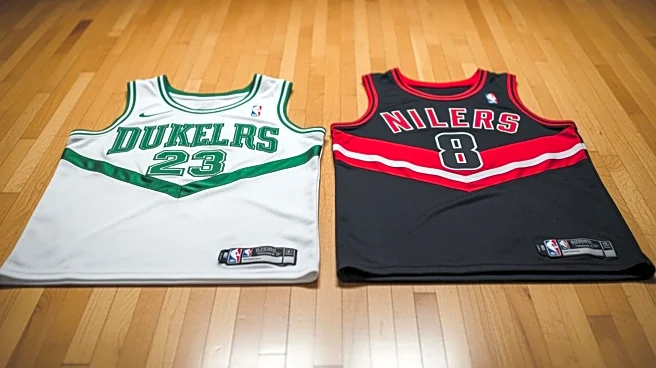What's Happening?
The Boston Celtics are contemplating a significant trade involving Jaylen Brown, a key player for the team, to acquire Giannis Antetokounmpo from the Milwaukee Bucks. This potential trade, as discussed by Fansided's Matt Moore, would involve Brown along
with Anfernee Simons, Sam Hauser, Xavier Tillman, and two first-round picks in exchange for Antetokounmpo, Myles Turner, and Bobby Portis. The Celtics are currently relying on Brown to lead the team offensively due to Jayson Tatum's recovery from an Achilles injury. Despite the potential benefits of reorganizing their future with Antetokounmpo, the Celtics are hesitant to proceed with the trade due to Brown's value as a player in his prime on a long-term contract.
Why It's Important?
This trade could significantly impact the dynamics of both the Celtics and the Bucks. For the Celtics, acquiring Antetokounmpo would mean restructuring their team around a new core, potentially enhancing their competitiveness in the long term. For the Bucks, losing Antetokounmpo could lead to a shift in their strategy, focusing more on strengthening their center position with Turner. The trade could also influence the NBA landscape, as Antetokounmpo is a high-profile player whose movement would attract considerable attention. The decision to trade Brown, a player highly valued by the Celtics, underscores the strategic considerations teams must weigh between immediate performance and future potential.
What's Next?
If the trade proceeds, the Celtics will need to adjust their strategy to integrate Antetokounmpo into their lineup, especially with Tatum's eventual return. The Bucks, on the other hand, would focus on optimizing their roster with the new additions. The outcome of this trade could also prompt other teams to reassess their strategies and player valuations, potentially leading to further trades and shifts in team compositions across the league.
Beyond the Headlines
The potential trade highlights the complexities of team management in professional sports, where decisions are influenced by player performance, contract terms, and long-term strategic goals. It also raises questions about player loyalty and the impact of trades on team morale and fan support. The move could set a precedent for how teams handle star players nearing the end of their contracts or seeking new opportunities.
















